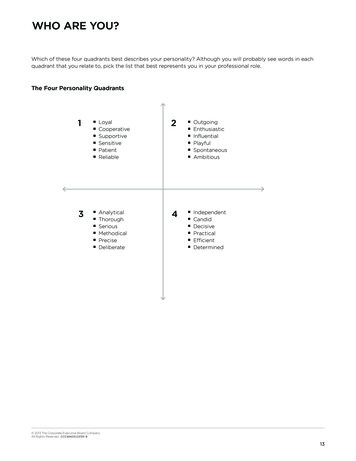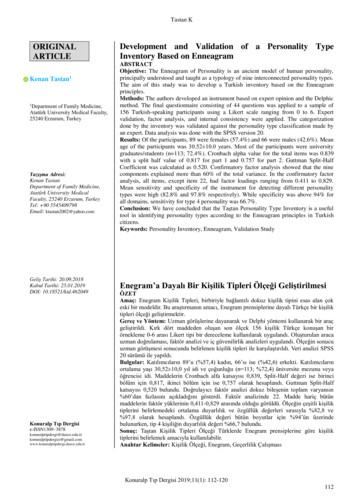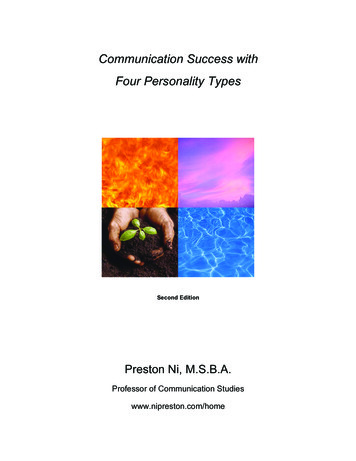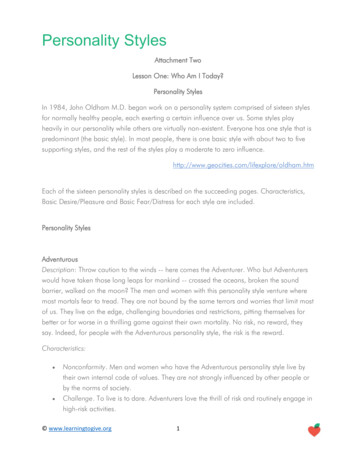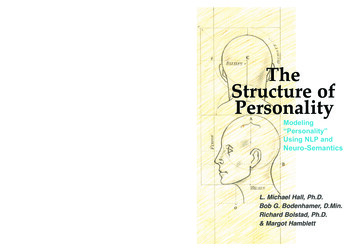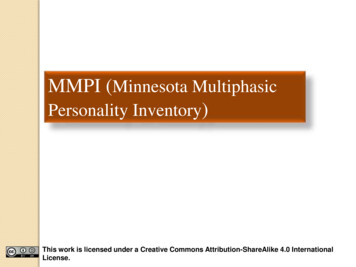
Transcription
Counselor HandbookA counselor/advisor’s guide for usingAchieveWorks Personality tounderstand, counsel and advise students
Table of ContentsIntroduction . 3Background . 3Reading Level . 4Overview of Personality . 5Why is Personality Such a Good Predictor of Career Satisfaction and Success? . 5Personality and Career Choice . 5The Four Dimensions of Personality . 5Profiles of All 16 Personalities . 9ENFJ . 9INFJ. 9ENFP . 10INFP. 10ENTJ . 11INTJ. 11ENTP . 12INTP. 12ESTJ . 13ISTJ . 13ESFJ . 14ISFJ . 14ESTP . 15ISTP. 15ESFP . 16ISFP. 16The Assessment . 17The Results . 18Career and Pathways . 19Working with Different Types of Students . 20Implementation and Support . 23Appendix: Resource Material for Learning More about Personality. 25Websites . 25Books . 26Articles . 27Last revised August 24, 2020AchieveWorks Personality Counselor Handbook2
IntroductionThis handbook has been written specifically for you – the college counselor/advisor who usesAchieveW orks Persona lity . It will ensure that both you and your students get the maximum benefit fromthis program.In preparation for using AchieveWorks Personality with students, we suggest you begin by first reading thishandbook in its entirety and then taking the assessment yourself. This will help you to understand the theorybehind the program and provide you with experience and practical advice, ensuring the best possibleresults when administering AchieveWorks Personality to your students.We hope you enjoy AchieveWorks Personality and that you find this handbook informative and a helpfulresource in using the program with your students. If you have feedback, questions or concerns, please don'thesitate to contact us.BackgroundThe popular use of personality is the result of the work of Swiss psychologist Carl Jung and two Americans,Katharine Briggs and her daughter, Isabel Briggs Myers. Briggs and Myers developed an instrument – theMyers-Briggs Type Indicator (MBTI ) – to help identify and explain the Jungian types. Personality and theMBTI have been embraced the world over as a non-judgmental tool for helping people better understandthemselves and others. Today, it is widely used by educators, counselors and clergy people. It is also used byFortune 500 companies to improve management effectiveness, help work teams function better, and assistpeople in making the most satisfying career decisions. AchieveWorks Personality Counselor Handbook3
Reading LevelThe readability of the AchieveWorks Personality assessment questions and report content has beenmeasured with the ReadablePro analysis tool, available online at readable.com. The tool provides scores forthe following five recognized tools, each of which uses a unique formula to determine the readability of apiece of text: The Flesch-Kincaid Grade Level, which rates one's comprehension of the text on a U.S. school grade level The Gunning Fog Index, which estimates the years of formal education one requires to understand thetext upon first reading it The Coleman-Liau Index, which provides an approximation of the U.S. grade level one requires tocomprehend the text The SMOG Index, which estimates the years of education one requires to understand the text The Automated Readability Index, which produces an approximation of the U.S. grade level one needs tocomprehend the textAdditionally, ReadablePro provides the "Readability Rating", a bespoke rating system that factors in all of thescores from the other algorithms to create an overall score, displayed as a letter grade.Item MeasuredAssessmentIndividual reportItem MeasuredAssessmentIndividual reportReadability RatingFlesch-Kincaid Grade LevelGunning Fog ScoreAA7.07.19.48.4Coleman-Liau IndexSMOG IndexAutomated Readability Index7.91010.29.55.56.2AchieveWorks Personality Counselor Handbook4
Overview of PersonalityPersonality refers to a system for understanding human behavior. It is based on the belief that there are 16distinct personalities and each person is most accurately described by one of those personalities.We believe that people are born with a specific personality, and that one's type does not change throughoutlife. Certainly, we grow, develop and change as a result of life experiences. And we develop a range ofbehaviors that are appropriate to given situations. This prompts us to act differently at a party than at afuneral. However, it is really our behaviors that change, and not our personality.The model of personality is non-judgmental. There are no personalities that are better or worse, or healthieror more frail. Each personality has its own inherent strengths and potential weaknesses. Personality does notpredict intelligence; rather it identifies important natural predispositions and tendencies.Why is Personality Such a Good Predictor of Career Satisfaction andSuccess?AchieveWorks Personality differs from other programs in several important ways. Perhaps most notable, it isbased on personality – the innate way people naturally see the world and make decisions – a set of basicdrives and motivations that remain constant throughout a person’s life. Other programs are based on thebelief that the best career decisions result from matching students’ values, skills and interests with specificjobs. In reality, however, values, skills and interests are quite fluid in young people and often changesignificantly as they grow older.Learning about their personality provides students with accurate and invaluable insights about themselvesand their career-related needs. This enables them to make the most informed and satisfying educationaland career decisions.Personality and Career ChoicePersonality is the foundation of this program because people are happiest and most successful in jobs thatallow them to use their greatest natural gifts. Personality is the best way of determining what those gifts are,and to pinpoint the occupations where people find the greatest opportunity for expression.The Four Dimensions of PersonalityThese dimensions are explained with the drill-down menu in the actual application itself, but should youdesire another perspective, this personality model describes the four basic aspects of human personality:how we interact with the world and where we direct our energy; the kind of information we naturally noticeand remember; how we make decisions; and whether we prefer to live in a more structured way (makingdecisions) or in a more spontaneous way (taking in information). We call these aspects of human personalitydimensions, because each one can be viewed as a continuum between opposite extremes, like this:AchieveWorks Personality Counselor Handbook5
How we interact with the world and where we direct our energy(E) Extraversion Introversion (I)The kind of information we naturally focus on and remember(S) Sensing Intuition (N)How we make decisions(T) Thinking Feeling (F)Whether we prefer to live in a more structured or in a more spontaneous way(J) Judging Perceiving (P)Everyone's personality falls onto one side or the other of the midpoint on each of these four scales. Theopposite sides of the scales are called preferences. If you fall on the extraverted side, then we say you have apreference for Extraversion. If you fall on the introverted side, we say your preference is for Introversion. It’simportant to keep in mind that everyone uses both sides of each dimension – for instance, people areprimarily extraverts or introverts, but they are not exclusively one or the other.All of us use both sides of all four scales in our daily lives, but we have an inborn preference for one side overthe other. Our preferred way of operating is more comfortable, automatic, trustworthy and competent. Keepin mind that each scale is a continuum and people may fall close to the midpoint, indicating a less clearpreference, or at the extreme ends, indicating a very clear preference.The bar chart (shown below) in the AchieveWorks Personality report displays your results in the fourdimensions of personality, each with two sides: Introversion (I) and Extraversion (E), Sensing (S) and iNtuition(N), Thinking (T) and Feeling (F), Judging (J) and Perceiving (P). The stars represent where you score in theassessment for each side of the dimension. The closer a star is to one side of a dimension, the clearer thepreference. A few individuals will score in the middle of a personality dimension. In those cases, the answerto an additional assessment question will ultimately determine their personality.AchieveWorks Personality Counselor Handbook6
Here is a brief review of the eight preferences and career implications – and how they impact a student’scareer needs.Extraversion (E) – Introversion (I)is about how we interact with the world and where we direct our energyExtraversionIntroversion Focuses attention outward Focuses attention inward Enjoys a variety of tasks Considers things fully before responding Seeks out and needs other people Enjoys tasks that require concentration Works at a rapid pace Works best on one project at a time Needs to talk about ideas to think them through Works at a careful, steady paceSensing (S) – Intuition (N)is about what kind of information we naturally focus on and rememberSensingINtuition Focuses on "what is" Focuses on "what could be" Likes working with real things Enjoys theory and speculation Applies past experience to solving problems Likes working with possibilities and implications Needs specific and realistic directions Needs to use imaginationThinking (T) - Feeling (F)is about whether we make decisions logically and impersonally, or by using personal valuesThinkingFeeling Enjoys analyzing problems logically Needs work to be personally meaningful Makes fair and objective decisions Likes helping others and being appreciated Needs to weigh the pros and cons to makedecisions Needs decisions to be congruent with values Can be tough negotiator Is driven to understand others and contribute Needs to work in a friendly environment Is motivated by achievementJudging (J) - Perceiving (P)is about the way we like to live our lives - more structured (making decisions)or more spontaneous (keeping options open)JudgingPerceiving Enjoys work that allows decision making Enjoys flexible and changing work situations Prefers a predictable work pattern andenvironment Likes to be able to respond to problems as theyarise Works on completing responsibilities before relaxing Is more satisfied with fewer rules andprocedures Likes to maintain control of projects Needs to have fun at workAchieveWorks Personality Counselor Handbook7
The preferences from the four dimensions are compiled to come up with a four-letter code, or personalitytype. A “type” is more than just a four-letter code that describes different “preferences.” Each type preferencetells something important about the individual. No one is solely an introvert, for instance. A person is an INTJ,an ISFP, or one of six other introverted types. In other words, while all introverts share certain characteristics,it is the other letters in their type – the combination of letters – that makes personality so rich and its insightsso valuable.AchieveWorks Personality Counselor Handbook8
Profiles of All 16 PersonalitiesENFJExtravert, Intuitive, Feeling, JudgingPeople like this are usually very warm, outgoing, and talkative. They make friends easily and are oftenpopular and well liked because they are so enthusiastic and cheerful. They care deeply for their family andfriends, and like to express their feelings through words and actions. People often say they have a gift forlanguage and are able to articulate their strong beliefs and opinions with tact. They are quite empatheticand seem to just know what other people are feeling. Tension, fights, or conflict make them veryuncomfortable so they try hard to please others and make peace between their friends.They hate direct confrontations and will “soften” their message or even avoid telling the entire hard truth ifthey feel it might hurt someone's feelings. While they have strong opinions, they sometimes back away fromwhat they really believe in. They sometimes choose harmony over total and frank honesty. Because they gettheir feelings hurt easily, it may be hard for them to hear even the most constructive criticism.Creative and often imaginative, they may love learning, daydreaming, and entertaining others with theirmany artistic talents. They have quick minds and are good at putting ideas and concepts together.Organized and productive, they get a blast of energy and satisfaction from getting projects done. They like tobe in charge and can usually come up with a plan of action for even complicated projects. But they tend tobecome annoyed when someone tries to change or interrupt their plans. They like to know what's expectedof them, and they care about what others think. They find it very hard to stay calm and objective whenthey're upset. They're very sensitive people; they know first-hand that it is both a blessing and curse to be soinsightful about others.INFJIntrovert, Intuitive, Feeling, JudgingPeople like this are usually imaginative, creative, and sensitive. They are private people, and take their time toget to know people and to let others get to know them. They probably have a small group of close andtrusted friends, and are generally cautious about jumping into new social situations. People describe themas thoughtful and empathetic, and they try hard to please the people they care about. Outwardly quiet, theyhave strong feelings and opinions, especially about the way people should treat one another. They are verycommitted to their beliefs so they may have trouble backing down or compromising their ideals just to getother peoples' approval. They can be somewhat perfectionistic. People sometimes disappoint them, andsince it's hard for them to stay objective, their feelings often get hurt.They may love to fantasize about the future, and probably enjoy creative activities like writing, reading,music, and art. They tend to be organized, efficient, and inventive about getting their work done, and theyare responsible and respectful people. Since they like to have a plan of action, they may get flustered bysudden changes and need plenty of time to adjust to or prepare for new experiences. They like spendingtime alone and while they may like doing things with their good friends, they are typically not the ones whoinitiate social activities. Since they are good listeners, people trust them and are often amazed by theoriginal insights they have about others. They naturally look below the surface to understand the deepermeaning in every experience and interaction.AchieveWorks Personality Counselor Handbook9
ENFPExtravert, Intuitive, Feeling, PerceivingPeople like this are very outgoing, enthusiastic, and spontaneous. They love meeting new people andprobably have a large circle of friends and acquaintances. Since they are always on the go and seem to haveboundless energy, they are usually up for any new experience and especially love surprises! They are verycurious, ask a lot of questions, and are fascinated by people or things that are out of the ordinary. Because oftheir vivid imagination, they have many ideas each day and are great at finding creative ways of solvingproblems or overcoming obstacles. They love to talk - especially about fun or interesting possibilities. Peopleenjoy their unusual sense of humor and find them fun to be around. They pride themselves on theiruniqueness.They are also sensitive and empathetic people who often have accurate insights about others. Their friendsknow they are devoted and affectionate and that they feel things very deeply, even if they don't always showit. But they may also take criticism personally and find their feelings are easily hurt. When they have a lot ofdetails to remember or projects to manage, they may become overwhelmed or discouraged. In fact, theircuriosity often distracts them from the more routine parts of projects and they probably find that stayingorganized is one of the hardest things for them to do. Making decisions is also a struggle because there areso many interesting options calling to them at once. Whatever career they choose, it has to be somethingthey believe in or they won't be able to stick with it for very long.INFPIntrovert, Intuitive, Feeling, PerceivingPeople like this are rare. They are unique and creative people who tend to march to the beat of their owndrummer. Private, quiet, and socially cautious, only friends who know them very well may ever see theirmore playful and expressive side. In fact, it takes a while for them to feel comfortable with new people sothey may often be described as somewhat reserved. But inside, they are people of great feeling and caredeeply for the people and causes that are dear to their hearts. Their personal values are most important tothem so they always try to make choices that they feel good about. They are rarely willing to compromise onanything that is really important to them. They can sometimes become overwhelmed by the intensity oftheir emotions, and their relationships need to be free of conflict or tension for them to remain in them.They are also highly imaginative people and may enjoy expressing themselves through the arts. But sincethey are also somewhat perfectionistic, they may have trouble hearing constructive criticism without takingit personally. They are quick to understand the deeper meaning of things, and often have fresh or originaltakes on events and people. Since, by nature, they prefer to act spontaneously, they resist too many rules ortoo much structure. And they may also have trouble staying organized or making decisions. At heart, theyare non-conformist and must find the path that is really right for them, even if it means striking out alone.AchieveWorks Personality Counselor Handbook10
ENTJExtravert, Intuitive, Thinking, JudgingPeople like this are confident and assertive. They almost always seem to be sure of themselves, and speaktheir minds directly and honestly. They have strong opinions and are usually able to convince others thattheir position is right. While they are naturally very fair, they are also rather outspoken. Because they are sofriendly and comfortable being the center of attention, they probably have a large circle of friends. Peopleadmire their determination and willingness to push themselves to achieve their very high standards.They are also creative people who like to ask thought-provoking questions. They love to learn but get boredwith any repetition, and constantly need a new challenge to stay interested. Imaginative and creative, theylike to look beyond the everyday to really understand why the world operates as it does. They are decisiveand organized, and since they like to be prepared at all times, they may find it difficult or embarrassing to tryto improvise. They like to be in charge, but sometimes take over projects that aren't really theirs. They arefrustrated by inefficiency, and find illogical rules infuriating. They want to be good at whatever they try, andthey especially like to demonstrate their competency to others. People around them look to them as naturalleaders and are often impressed with their knowledge. They are people that others respect so others feelcomfortable giving these ENTJ personalities a lot of responsibility.INTJIntrovert, Intuitive, Thinking, JudgingPeople like this are intense, private, and creative. They are highly imaginative and intellectual people, and arerarely satisfied with anything less than a full and logical understanding of issues. Serious, quiet, and cautious,they tend to initially hang back from new social situations, and they are pretty selective about whichactivities they get involved in and which people they befriend. They probably have a small group of trustedfriends and also enjoy spending time alone, delving deeply into the subjects and activities that interestthem. They keep their feelings and private thoughts to themselves, or share them occasionally with their veryclosest friends. They have a rich inner life and may enjoy studying and reading about perspectives orlifestyles that are out of the ordinary. They quickly grasp complex concepts or theories, and are able to gleanthe less obvious meanings of information. But they may have little patience for anything superficial orrepetitive.They are super independent and are willing to stand up for their positions, even if others disagree. But theymay be stubborn and have difficulty changing their mind once they’re made up. They are also naturallyskeptical and question the way things are, so only a sound logical argument is likely to persuade or convincethem. Calm and emotionally self-contained, they don't like when other people exaggerate or overreact.Overall, they are much more interested in meeting or exceeding their own high personal standards thantrying to please other people.AchieveWorks Personality Counselor Handbook11
ENTPExtravert, Intuitive, Thinking, PerceivingPeople like this are friendly, creative, and confident. Since they love to talk and tell engaging stories, theyhave lots of friends and acquaintances and are pretty easy to get to know. They love being in the spotlightand especially enjoy entertaining others with their clever wit and unusual sense of humor. They probablyhave little trouble adapting to change, and most people admire their adaptability. They pride themselves ontheir creativity and ability to see possibilities where other people can't. They grasp new ideas quickly andenjoy learning new things, but they are easily distracted and tend to get bored as soon as the challenge inprojects is over. While they are easy-going and playful, it is often a struggle for them to make decisions orcommit to one plan of action for any extended period of time since they are so curious and eager toexperience as much of life as they can.They are also very logical and are bothered by inconsistency and unfairness. They love a spirited debate –regardless of the topic – but can sometimes be argumentative. Their spontaneity and enthusiasm areinfectious, and other people often want to follow their lead. S
The popular use of personality is the result of the work of Swiss psychologist Carl Jung and two Americans, Katharine Briggs and her daughter, Isabel Briggs Myers. Briggs and Myers developed an instrument –the Myers-Briggs Type Indicator (MBTI ) – to help identify and explain the Jungian
